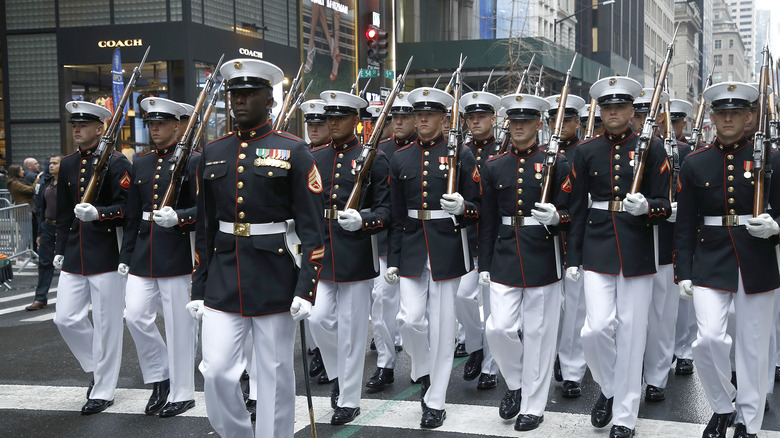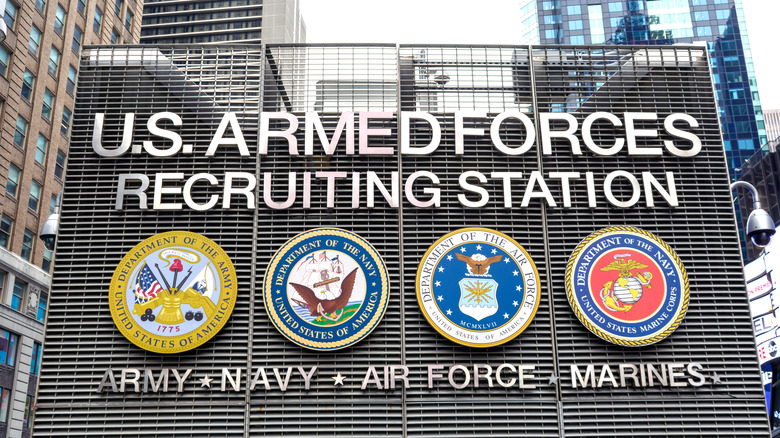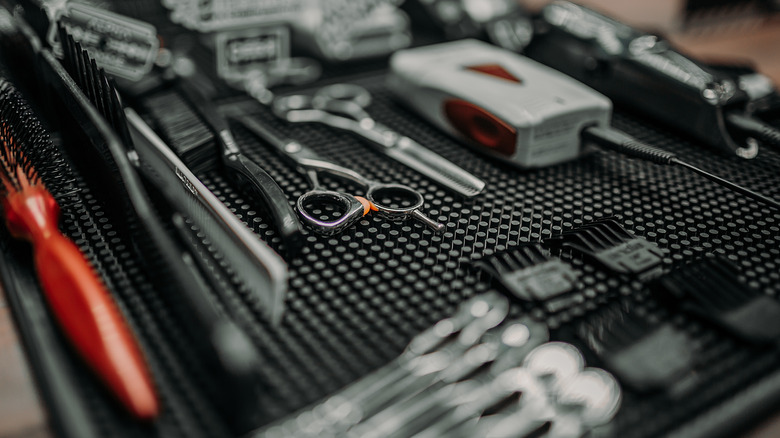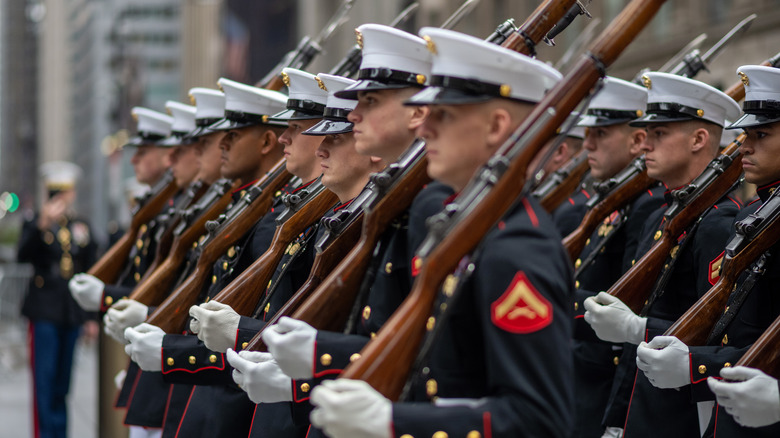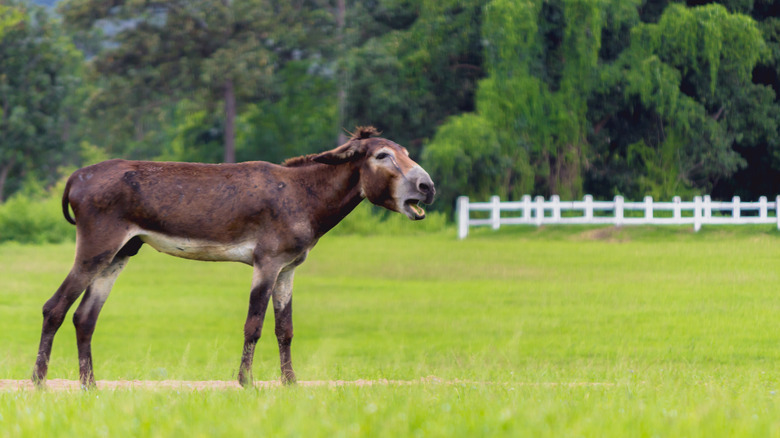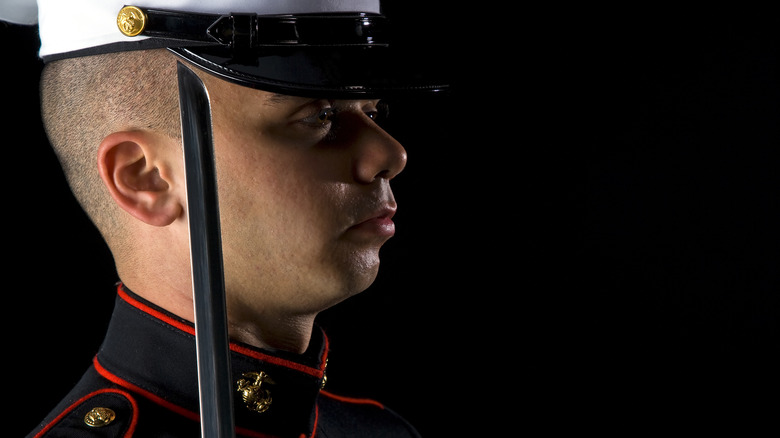The Biggest Theories On Why We Call Marines Jarheads
Militaries throughout history have relied on speaking in codes to protect their secrets from eavesdroppers, or to make sure the right message gets across. Specialized lingo is part of the job. But that doesn't stop at just military procedures, at least not for the U.S. armed forces. Every branch of the military has its preferred slang terms and nicknames for the members within it.
The U.S. Marines in particular have gone by a number of names in their history. From "gyrenes" to "grunts," the Marine Corps have earned plenty of nicknames from other troops (via National Museum of the Marine Corps). Probably the most recognized nickname is "jarhead," according to the museum. Like many other terms, it was coined as an insult before it was taken by the Marines and turned into a source of pride. But what was the basis of the insult in the first place, and what has made it so popular?
Rivalries in the U.S. Military
The U.S. Marine Corps is one of the oldest branches of the military, alongside the U.S. Navy. The two have coexisted since the Revolutionary War, and with that tenured service came a lot of time to interact with each other. Because the Marine Corps work in areas that overlap with the Navy pretty often, the two have developed quite the rivalry (via National Museum of the Marine Corps). Like many rivalries, theirs comes with insults and name calling.
Sailors in the U.S. Navy are actually suspected to be the originators of the nickname "jarhead" around World War II. But the Marines have a history of taking those insults in stride, according to the National Museum of the Marine Corps, and typically voluntarily adopted a lot of their assigned nicknames. That's what happened with jarhead, which members of the Marine Corps now use as a badge of honor.
A regimented hair routine
"Jarhead" could come from a few different places. Nicknames for the Marines have been around for decades, and the exact origin of many of them — such as "grunt" or "gyrene" — aren't exactly clear (via National Museum of the Marine Corps). But there's one possibility that stands out: the haircut. Marines frequently opt for the "high and tight" haircut, shaving off their hair at the sides and cropping it close and square on top. The style has been popular among Marines for decades, and many were frequenting barbershops for a touch-up even at the height of the pandemic (via My Stateline).
But the haircut could have been a source of ridicule from other branches who weren't as uniform in their hairstyles, according to Mental Floss. You could argue the "high and tight" either makes a Marine's head look like a jar, or at least like it's sticking out of one.
It's all about the uniform
Another theory on the origin of "jarhead" says that the Marines' uniforms played a part. The uniform has been a source of mockery throughout history, according to Mental Floss. Because it was originally made primarily of leather, Marines were dubbed "leathernecks" by their brothers-in-arms.
The stiff neck, while no longer made of leather, might have contributed to the "jarhead" moniker. According to the National Museum of the Marine Corps, the name came in part from the way Marines look in their dress uniforms, because their heads appear to be poking out of a jar.
The resemblance to a jar wasn't just physical, either. Another theory documented by Mental Floss claims the term "jarhead" was chosen because Marines are trained to be tough on the outside, and keep any thoughts or emotions bottled up inside, like a jar full of jam.
Stubborn as a mule
The term "jarhead" wasn't created to mock Marines, though. According to Desert News, the term existed well before that. At first, it actually described mules. The term "jarhead" was meant to represent the animal's ability to complete hard labor and difficult tasks without much thought. That is to say, a mule's head is "empty as a jar." It also could come from the mule's stubbornness. Over time, "jarhead" came to reference mules specifically used by the military for transportation of goods.
It's not that much of a leap, then, to use the term for members of the armed forces themselves. As an insult, the name has a pretty clear meaning: thickheaded and dumb. It's pretty surprising, then, that the name has come to be a source of pride for Marines themselves. But maybe for them the term takes on a different interpretation — someone strong and willing to put in the work.
Popularity among Marine Corps members
The term "jarhead" might have started off as an insult, but it's come to be a source of pride for members of the Marine Corps (via Desert News). It took off in popular culture, too. There's a movie called "Jarhead" starring Jake Gyllenhaal, according to IMDb, and it shows up in a number of books written by and about members of the Marine Corps. It's clear that "jarheads" don't see the term as an insult, at least not when they use it for themselves or for each other.
It might not seem like much compared to some of the other terms used in the military. Other branches get to claim nicknames like jackals, jaguars or wasps, which seem more aggressive and appealing than being called a stubborn mule (via Maritime Quest). But regardless of where it came from, Marines seem to be content with keeping the "jarhead" name around.
